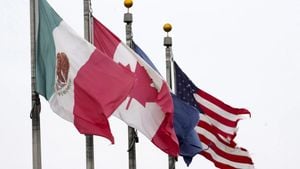Thailand is gearing up for 2025 with ambitious economic projections, signalling potential for growth amid various challenges. Financial experts predict the nation's economy will rebound as strategic investments are set to stimulate consumer confidence and overall economic activity. The government, alongside the Bank of Thailand, is exploring ways to navigate past sluggishness and create conducive conditions for economic propulsion.
Projected growth rates suggest Thailand is on the path to recovery from recent economic downturns, with finance analysts indicating confidence levels on the rise. According to Reuters, one noted, "Thailand's economy is expected to rebound as we strategize investments and bolster consumer confidence." This optimism is hinged on positive movement within key sectors such as tourism, exports, and manufacturing, which are all set to play pivotal roles as the year progresses.
The tourism sector, which has traditionally been the backbone of Thailand's economy, is anticipated to see significant improvements as travel restrictions lift globally. Industry insiders expect foreign visitors to increase markedly, facilitating spending and boosting the local economy. The hope is to capitalize on pent-up demand, as people are eager to travel post-pandemic.
Experts expect inflation to be one of the most pressing challenges as the economy recovers. Inflation management will be key to achieving growth targets, states an economist from the Bank of Thailand, emphasizing the need for measures to keep prices stable. These actions are seen as necessary, not only to protect consumers but also to safeguard businesses as they work to recover.
The Thai government aims to stimulate growth through various fiscal policies and regulatory reforms, focusing on enhancing productivity across sectors. A financial expert articulated, "The government aims to stimulate growth through targeted fiscal policies," indicating there will be provisions made for businesses to thrive more easily.
Thailand's projections for 2025 are ambitious yet achievable, contingent on aligning strong consumer sentiment with targeted government spending. Measures are being planned to address infrastructural needs and boost technological advancements, ensuring the nation remains competitive on the global stage.
Trading activities and investment flows are expected to accompany sustained economic improvement as positive indicators emerge through data assessments by monitoring agencies. Engaging with the private sector will be of utmost importance to advancing the economic agenda.
Key investments will be directed toward infrastructure, which has lagged as the country sought to manage public finances amid declining revenue growth. Investments here are viewed as fundamentally linked to long-term economic health. The government is firmly optimistic though, with comments emphasizing the integration of advanced manufacturing and digital economy sectors, necessary for the current global economic reality.
Despite the challenges, the projections spell potential for healthy economic dynamics. The necessity for continuous evaluations and adaptations of policies will remain, ensuring flexibility is built to manage upcoming economic fluctuations.
The prospects for 2025 seem aligned with strategic goals of enhancing trade balances and government spending to cushion the economy during transitions. Thailand’s holistic approach may set the stage for resilience and sustainability moving forward.
Experts will continue to watch how governmental actions play out, particularly against the backdrop of global economic trends and domestic necessities. Discussing the general outlook, one financial analyst stated, "Future growth can hinge on how effectively we address inflation and boost consumer confidence hinged on fiscal adjustments."
With many variables at play, Thailand's path to economic recovery appears cautiously optimistic, providing foundational insights necessary for forthcoming policy development and economic frameworks leading to 2025.



